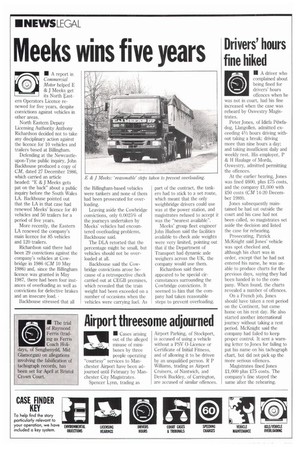eeks wins five years
Page 26

If you've noticed an error in this article please click here to report it so we can fix it.
• A report in Commercial Motor helped E &J Meeks get its North Eastern Operators Licence renewed for five years, despite convictions against vehicles in other areas.
North Eastern Deputy Licensing Authority Anthony Richardson decided not to take any disciplinary action against the licence for 10 vehicles and trailers based at Billingham.
Defending at the Newcastleupon-Tyne public inquiry, John Backhouse produced a copy of CM, dated 27 December 1986, which carried an article headed: "E & J Meeks gets pat on the back" about a public inquiry before the South Wales LA. Backhouse pointed out that the LA in that case had renewed Meeks' licence for 40 vehicles and 50 trailers for a period of five years.
More recently, the Eastern LA renewed the company's main licence for 85 vehicles and 120 trailers.
Richardson said there had been 29 convictions against the company's vehicles at Cowbridge in 1986 (CM 10 May 1986) and, since the Billingham licence was granted in May 1987, there had been four instances of overloading as well as convictions for defective brakes and an insecure load.
Backhouse stressed that all the Billingharn-based vehicles were tankers and none of them had been prosecuted for overloading.
Leaving aside the Cowhridge convictions, only 0.0025% of the journeys undertaken by Meeks' vehicles had encountered overloading problems, Backhouse said.
The DLA retorted that the percentage might be small, hut vehicles should not be overloaded at all.
Backhouse said the Cowbridge convictions arose because of a retrospective check carried out at CEGB premises, which revealed that the train weight had been exceeded on a number of occasions when the vehicles were carrying fuel. As part of the contract, the tankers had to stick to a set route, which meant that the only weighbridge drivers could use was at the power station, and magistrates refused to accept it was the "nearest available".
Meeks' group fleet engineer John Hudson said the facilities available to check axle weights were very limited, pointing out that if the Department of '1'ransport had dynamic axle weighers across the UK, the company would use them.
Richardson said there appeared to be special circumstances surrounding the Cowbridge convictions. It seemed to him that the company had taken reasonable Steps to prevent overloading.
































































































